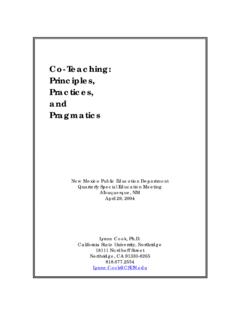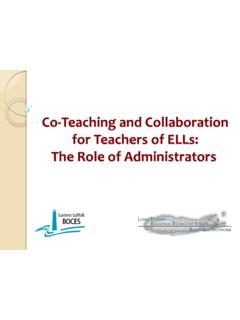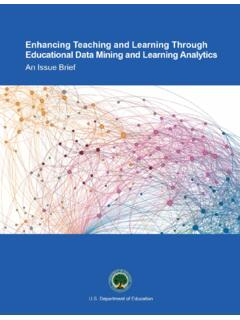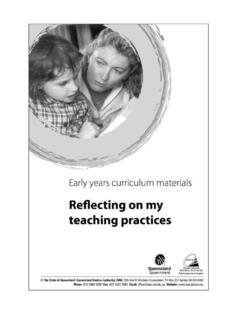Transcription of SKILLS FOR 2030 - OECD
1 SKILLS FOR 2030 SKILLS FOR 2030 OECD Future of Education and SKILLS 2030 Conceptual learning frameworkWell-being2030 ActionAnticipationRe ectionValuesAttitudesKnowledgeSkillsCore foundationsTransformativecompetenciesCre atingnewvalueTakingresponsibilityReconci lingtensions&dilemmasCo-agency with peers, teachers, parents, communitiesCompetenciesWell-being2030 Student agencyMore content at: this page foran interactive experienceSKILLS FOR 2030 SKILLS are the ability and capacity to carry out processes and be able to use one s knowledge in a responsible way to achieve a goal. SKILLS are part of a holistic concept of competency, involving the mobilisation of knowledge, SKILLS , attitudes and values to meet complex demands. The OECD Learning Compass 2030 distinguishes between three different types of SKILLS : cognitive and meta-cognitive SKILLS ; social and emotional SKILLS ; and physical and practical SKILLS . As trends such as globalisation and advances in artificial intelligence change the demands of the labour market and the SKILLS needed for workers to succeed, people need to rely even more on their uniquely (so far) human capacity for creativity, responsibility and the ability to learn to learn throughout their and emotional SKILLS , such as empathy, self-awareness, respect for others and the ability to communicate, are becoming essential as classrooms and workplaces become more ethnically, culturally and linguistically diverse.
2 Achievement at school also depends on a number of social and emotional SKILLS , such as perseverance, efficacy, responsibility, curiosity and emotional and practical SKILLS are not only associated with daily manual tasks, such as feeding and clothing oneself, but also with the arts. To date, researchers have been unable to identify a comparable activity that develops the cognitive capacity of children in the same ways or to the same extent as music and arts education does. Engaging with the arts also helps students develop empathic intelligence, which enhances their emotional engagement, commitment and POINTS As computer technologies have displaced labour in routine tasks, they have also created new employment opportunities for workers with non-routine cognitive SKILLS , such as creativity, and social and emotional SKILLS . To remain competitive, workers will need to acquire new SKILLS continually, which requires flexibility, a positive attitude towards lifelong learning and curiosity.
3 Social and emotional SKILLS can be equally and in some cases even more as important as cognitive SKILLS in becoming a responsible BRIEFS ocial and emotional SKILLS , such as empathy and respect for others, are becoming essential as classrooms and workplaces become more the full concept note, click ectionValuesAttitudesKnowledgeSkillsCore foundationsTransformativecompetenciesCre atingnewvalueTakingresponsibilityReconci lingtensions&dilemmasCo-agency with peers, teachers, parents, communitiesCompetenciesWell-being2030 Student agencyOECD LEARNING COMPASS 2030 Prof. Dr. Ingrid SCHOON, Human Development and Social Policy, The Institute of Education, University of London, UKSource: AND EMOTIONAL SKILLS Learning to Learn, India, Interdisciplinary learning Source: TO LEARNV isit: DOWNLOAD the free SnapPress mobile app2. SCAN this page with 3. DISCOVER interactive contentmobile app2 SCAN. DISCOVER 4 OECD Future of Education and SKILLS 2030 Concept Note OECD 2019 SKILLS for 2030 As defined by the international group of stakeholders involved in the OECD Future of Education and SKILLS 2030 project, SKILLS are the ability and capacity to carry out processes and to be able to use one s knowledge in a responsible way to achieve a goal.
4 SKILLS are part of a holistic concept of competency, involving the mobilisation of knowledge, SKILLS , attitudes and values to meet complex demands. The OECD Learning Compass 2030 distinguishes between three different types of SKILLS (OECD, 2018[1]): cognitive and meta-cognitive SKILLS , which include critical thinking, creative thinking, learning-to-learn and self-regulation social and emotional SKILLS , which include empathy, self-efficacy, responsibility and collaboration practical and physical SKILLS , which include using new information and communication technology devices Cognitive SKILLS are a set of thinking strategies that enable the use of language, numbers, reasoning and acquired knowledge. They comprise verbal, nonverbal and higher-order thinking SKILLS . Metacognitive SKILLS include learning-to-learn SKILLS and the ability to recognise one s knowledge, SKILLS , attitudes and values (OECD, 2018[1]).
5 Social and emotional SKILLS are a set of individual capacities that can be manifested in consistent patterns of thoughts, feelings and behaviours that enable people to develop themselves, cultivate their relationships at home, school, work and in the community, and exercise their civic responsibilities (OECD, 2018[1]; OECD, [2]). Physical SKILLS are a set of abilities to use physical tools, operations and functions. They include manual SKILLS , such as the ability to use information and communication technology devices and new machines, play musical instruments, craft artworks, play sports; life SKILLS , such as the ability to dress oneself, prepare food and drink, keep oneself clean; and the ability to mobilise one s capacities, including strength, muscular flexibility and stamina (OECD, 2018[1]; OECD, 2016[3]). Practical SKILLS are those required to use and manipulate materials, tools, equipment and artefacts to achieve particular outcomes (OECD, 2016[3]).
6 Cognitive SKILLS , such as creative thinking and self-regulation, and social SKILLS , such as taking responsibility, require the capacity to consider the consequences of one s actions, evaluate risk and reward, and accept accountability for the products of one s work. This suggests moral and intellectual maturity, with which a person reflects upon and evaluates his or her actions in light of his or her experiences, personal and societal goals, what he or she has been taught and told, and what is right or wrong (OECD, 2018[1]). While good decision making and ethical judgement are encompassed in the concept of SKILLS , these competencies are addressed in the concept note on Attitudes and Values. 5 OECD Future of Education and SKILLS 2030 Concept Note OECD 2019 The transfer of knowledge and SKILLS takes place in social contexts The concept notes on Knowledge and on Attitudes and Values mention that knowledge, SKILLS , and attitudes and values are not competing competencies but rather are developed interdependently.
7 The acquisition of knowledge requires certain cognitive SKILLS . Those SKILLS and relevant content knowledge are not only intertwined, they also reinforce each other. In addition, attitudes and values are integral to developing knowledge and SKILLS as motivation for acquiring and using knowledge and SKILLS , and in framing the definitions of what constitutes well-being , good personhood and citizenship (Haste, 2018[4]). The transfer of knowledge and SKILLS from one situation to another takes place in social contexts. Abuzour, Lewis and Tully (2018[5]) completed a study that supports this social foundation of transfer. They find that, first, students must have sufficient basic knowledge to be able to transfer SKILLS . Then, support from colleagues and adherence to guidelines helps students transfer their SKILLS from the classroom to the workplace. Reinforcement is an important component of transfer as, without it, students and employees may perceive that the transfer is not valued and thus not bother to apply learned SKILLS in new contexts (Benander, 2018[6]).
8 Educators can help beginners apply routine SKILLS , such as information processing, in a range of unfamiliar and loosely defined situations. That will help learners practice applying their knowledge and SKILLS in different ways. Some research has been conducted on the transfer of knowledge and SKILLS through formats such as play (DeKorver, Choi and Towns, 2017[7]) and project-based learning (Lee and Tsai, 2004[8]). Considerably more research has focused on the cognitive and metacognitive transfer between languages. For example, Baker, Basaraba and Polanco (2016[9]) review the literature on student learning in bilingual education. They find that bilingual language instruction helped students perform better in reading SKILLS in both languages, although they report that there are few studies on writing SKILLS and bilingual programmes. See Ciechanowski (2014[10]), Martinez-Alvarez, Bannan, and Peters-Burton (2012[11]), Keung and Ho (2009[12]) for other studies.
9 Cognitive SKILLS are essential; metacognitive SKILLS are becoming so Creativity and critical thinking are needed to find solutions to complex problems Technology influences how we think about human intelligence and the demand for the types and level of SKILLS needed for the future. Over recent decades, computer-controlled equipment has replaced workers in a wide range of jobs that consist of routine tasks tasks that follow well-defined procedures that can easily be expressed in computer code . Most routine work, such as repetitive calculating, typing or sorting, and production tasks that revolve around performing repetitive motions, have been automated since the early 1980s (Figure 1). At around the same time, the demand for non-routine interpersonal and analytical SKILLS increased dramatically. The explanation is straightforward: as computer technologies have displaced labour in routine tasks, they have also created new employment opportunities for workers with non-routine cognitive SKILLS , such as creativity, and social and emotional SKILLS (Berger and Frey, 2015[13]; Bialik and Fadel, 2018[14]).
10 Non-routine manual jobs at first declined in number then plateaued at a baseline level, an indication that there remains some demand for the products and services these jobs provide. 6 OECD Future of Education and SKILLS 2030 Concept Note OECD 2019 Figure 1. Changing prevalence of types of tasks required for work over time Note: This figure shows how the task composition performed by US workers changed between 1960 and 2009. Source: Autor and Price (2013) in Bialik and Fadel (2018[14]), , Artificial intelligence (AI) is adding depth and scale to the challenges posed by technology. Societies will need to determine what is wanted from human intelligence, how best human intelligence can work with AI, how human and artificial intelligence can complement each other and, as a consequence, what new knowledge and SKILLS must be acquired and cultivated. By creating AI systems that are able to learn in increasingly sophisticated ways, human intelligence also becomes more sophisticated (Luckin and Issroff, 2018[15]).

















